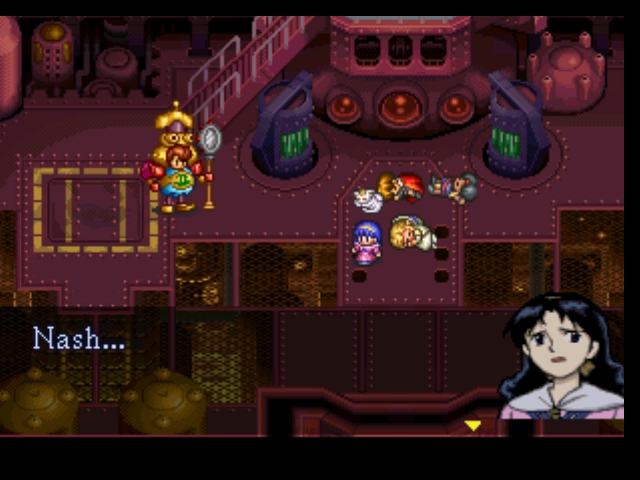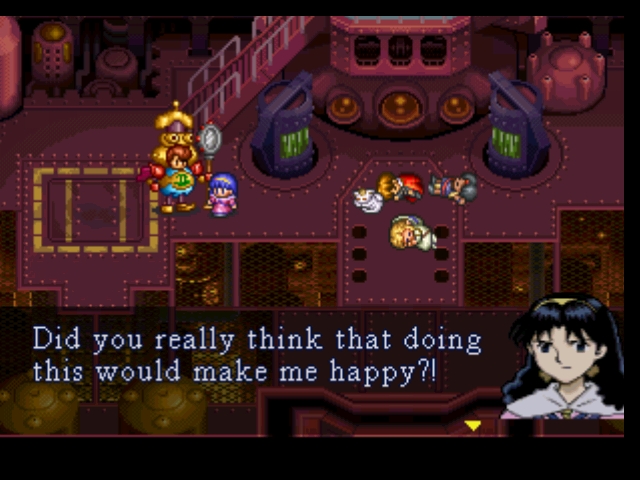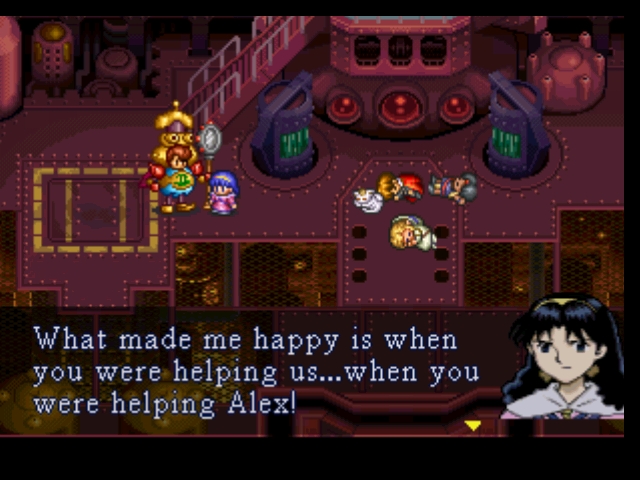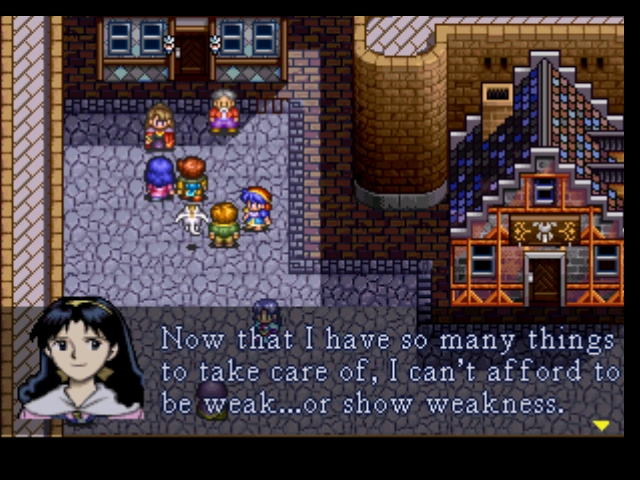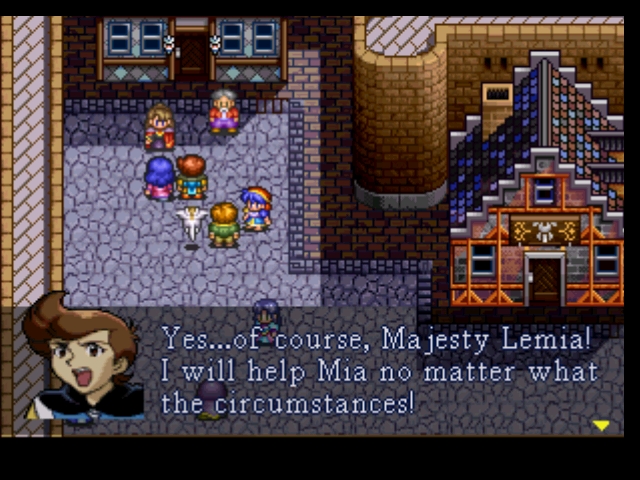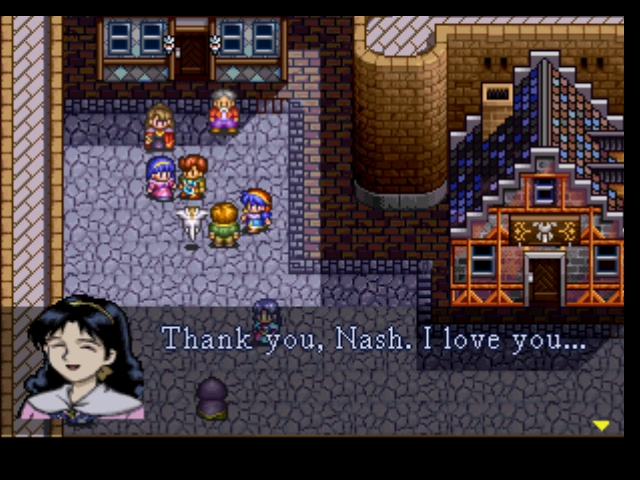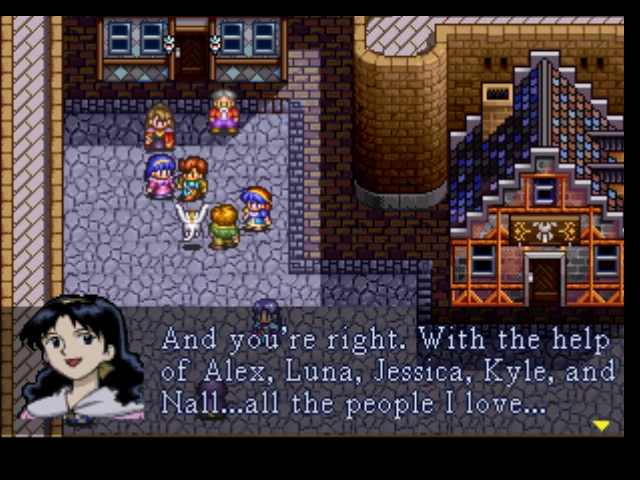Admittedly, nowhere is it implied that it's Mia's "fault" that Vane wasn't back up the next day, but, honestly, I was really, really surprised when I played Lunar 2 for the first time, only to discover that it had apparently never returned to it's former glory. That's a very sad thing, because in Lunar's world, Vane is a big deal, as it represents the keeper of and future betterment of the world's magic. Their love of magic and the forces that be are kept safe in Vane. Now, magic belongs to everyone in that world, but, it was nice to have it all kept nicely, and have an organized school. It is a travesty upon that world that it fell, and if Mia's heirs didn't return it in 1,000 years, there's a problem.
You could argue that maybe it was up for a time, but, that's very unlikely, seeing as the writers saw Lemina as Mia's daughter. There would be plenty of generations between them, but, 1,000 years is a long time to comprehend, and from what I understand, Lunar 2 was originally supposed to be a direct sequel featuring the descendants of the main characters. We never hear about Vane being restored in the meantime, so, I assume it wasn't, but, no, it never really says.
What I feel is missing from Vane is not male dominance, but, instead,
proper male complimentarity. Unfortunately, my point about how I believe they work together is being misinterpreted as "men over women". Mia is gentle as her defining characteristic, but, this doesn't mean she isn't strong, too. The Ausas are a matriarchal dynasty in Lunar's world. This is interesting to explore, because the world is fictional, but, in real life terms, I'm not in favor of a society ruled solely by either men, or women. A matriarchy would be women over men, and Nash quite frankly humbles himself before her. Vane does not have a strong male in it, and is shown to eventually fall as a functional city, floating or not, throughout the series. Make of what whatever you want.
With the terms "alpha" and "beta", I used them because they're stereotypical terms. I wouldn't describe people in real life using them, but, Kyle and Nash demonstrate stereotypical aspects of male behavior; you know, because they're actually cartoons, and they need exaggerated features, including personality traits. I had no intention of throwing the conversation this far off by using them, but, I'm unfamiliar with their origin, and figured that I was using them properly by only making caricature comparisons. In real life, they would be more like insults, I would imagine. Heh, um, sorry about the confusion. I'm rather unfamiliar with them being taken 100% seriously. My apologies; I guess this speaks of my naivety about some things...
Shinto-Cetra wrote:Also on Sega CD L1, Xenobia is a much more effective villain, who isn't only pining for Ghaleon, and does much of her own dirty work. Not to mention, the Althena religion on SCD L1 has preistesses, and on PS1/PSP L1 Phacia is the current high priestess.
Again, you're confusing what I think of as traditional roles as today's version of a patriarchy, which is basically men dominating women, not lovingly taking care of them, and being reciprocated. Ghaleon seeks to dominate, or "take", and not give, and Alex seeks to care for ("give") of himself to the same goddess. Alex wins, therefore, that's what I believe Lunar is supporting.
Females do have some positions of authority, but, Xenobia, Phacia, and Royce represent The Vile Tribe. They're the bad guys, and they fail. Ghaleon is still the leader, who is, obviously, a bad man. Phacia meant well, and she has the best outcome, and she was friends with Alex over Ghaleon, and do you know why? She was the one who recognized Luna's personal moral strength, instead of trying to nullify it, like the others.
My position is not that women can't do anything. They're seen fighting and working, because those things need done. But, ultimately, the goddess is saved by a just man who intends to protect her, because it's satisfying for a man to do so. He wants to.
To better understand me, look at what I think the characters represent:
Luna: She is truly Althena, a goddess. In this world, the goddess is a very feminine, very nurturing entity that was responsible for creation; life. She doesn't protect herself, she gets protected.
Alex: He has an intense desire to love, protect, and make sure Luna is safe. He is, in some ways, more powerful than she is, because, as we see in PSP Harmony, even at full power, the goddess needs to be protected. She basically has no physical strength. She is relying on him. Yet, he owes his life to her; she's the reason he exists.
They are giving to one another.
Ghaleon: He seeks to dominate over the feminine force of creation that Luna holds. He doesn't care about her as a person, because she's not doing what he wants, and what he thinks is necessary. He was a priest once; he'd happily be more submissive towards her ultimate power if they agreed more. What he wants is what he feels is a more appropriate authority.
Every single human being wants to give and receive authority. BOTH men and women have authority. Just a different kind. How they give and receive is tied to their gender, in my eyes. But, it's the idea of them working together that I enjoy. As a woman myself, I realize that I have something very important inside of me, that no one can have, or even touch, unless I choose to give it to them. Alex goes on a quest to get the blessings of the 4 dragons to ensure that he is worthy of what Luna/Althena has to give, and the right to protect it.
Women are in control, something a patriarchal religion wouldn't allow.
Those three women you used in context take orders from Ghaleon, so, that's not really true. Although, Althenism certainly has room for female priests, and the standards seem to be pretty high.
Women kind of are, and kind of aren't in control in Lunar. Kind of like the men are kind of and kind of not in control. The only reason I think that a man should be a leader is because of their physical strength, and their inherent giving nature is one that is different than what a female has. Not every man makes a good leader, obviously. He has to be willing to give extensively of himself to be Dragon Master, to be able to have the right all of that authority, but, it's shown to be Alex's desire. And we're talking about ideals, here; it's not a 1:1 to life itself.
And actually, in ancient the Hebraic religion that eventually became Christianity, women were allowed to have a priest-like service, of sorts, by way of making a special promise that was quite costly, but, they got what they wanted. They were not denied something they wanted to give, even if they wouldn't be in the same league as a high priest. It was the Levite family of priests that were well known to have their men be required to do service, but, they were happy to do it, because it was a position of immense honor.
I'd say it's more the way the game went about removing them. It makes them look unusually helpless considering how steadfast and capable they are throughout the rest of the game.
I can see that, but, ALL of the women in the village were sick. It's not like they were only picking on the girl party members. If nothing else, it made you really understand how important they were to the party, especially if you happened to be under-leveled. You lost your healer, after all! In the Lunar Magic School spin off, the whole party is all girls, all the time, so, it's not like they never got theirs.
....I'm sorry if I bumble my way through this. Honesty, it's the first time I've ever discussed it with anyone. I really thought Lunar shows a variety of types of authority, but, ultimately, a union of the sort that I liked was present. That's about it.


